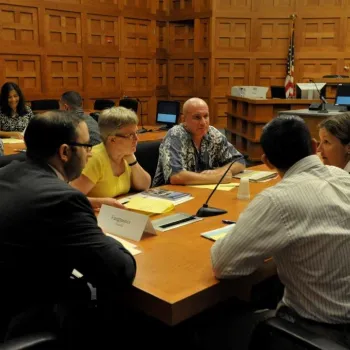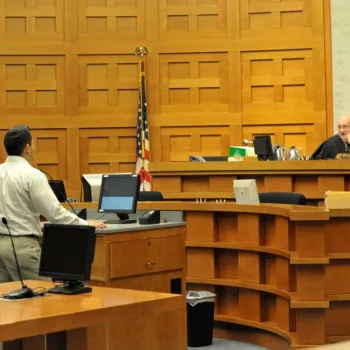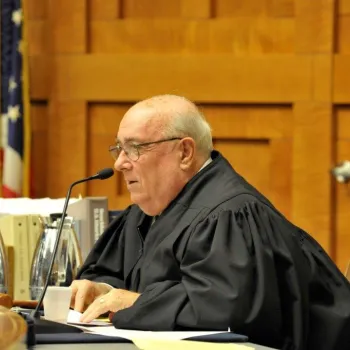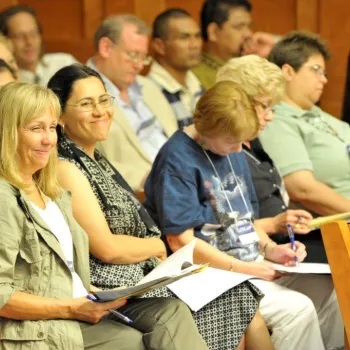As teachers bid farewell to their students for the summer, federal courts are offering them a chance to spend the dog days in hands-on, interactive professional development seminars in the courtroom. Teachers are able to observe court proceedings, participate in realistic simulations of hearings and jury deliberations, and talk with judges, attorneys, and other legal experts — all with the aim of enriching their lesson plans in the fall.
Federal court-sponsored teachers institutes are growing in number and occupy a unique niche in law-related education for high school teachers. They are conducted in courthouses with a faculty of judges, lawyers, and other judicial system professionals, and they typically focus on timely topics infused with court fundamentals. The institutes’ extensive, informal interactions with legal professionals are highly rated by teachers in program evaluations.
The annual Summer Teacher Institute in the Eastern District of Missouri attracts teachers from around the state for a two-day program at the court’s Judicial Learning Center, a 2,500-square-foot space in the Thomas F. Eagleton U.S. Courthouse in St. Louis. Learning activities are aligned with state and national social studies standards and focus on topics such as judicial independence, differences between state and federal courts, the appellate process, and Supreme Court cases that originated in Missouri.
“Because of the Judicial Learning Center, our court was already interacting with teachers and giving them tours before we started the teachers institute,” said Rachel Marshall, the court’s education specialist. “Offering professional development for teachers was a natural next step.”
The program has grown so popular that Marshall added a second seminar for teachers, a homeschool educator workshop, and a teacher advisory council, which will allow teachers who have participated in the program to be presenters at future seminars.
Other teachers institutes are planned or are underway around the country:
-
In Boise, the District of Idaho, the state Supreme Court, and the University of Idaho College of Law collaborate on a two-day program with a faculty that includes 16 federal and state court judges, master teachers, and journalists. Teachers develop strategies for bringing best practices in civics education to their school districts with an emphasis on judicial independence, the rule of law, and the role of the courts.
U.S Magistrate Judge Candy Dale, of Boise, said she’d like to make the institute’s lesson plans available to teachers across the state. “We try to present material in a way that makes it easy to translate into a curriculum, and we’re putting together a lesson resource bank for teachers,” she said.
-
In Seattle, the Western District of Washington and Seattle University conduct a three-day seminar that qualifies participants for continuing education credits that are helpful to advancing in their careers. Now in its fifth year, the Judicial Institute for High School Teachers provides hands-on court experiences for 60 teachers in collaboration with judges, attorneys, law enforcement personnel, and other professionals.
This year, the teachers will also hear from Mary Beth Tinker, one of two plaintiffs in the landmark 1969 case Tinker v. Des Moines, which held that students do not lose their right to free speech when they step onto school property. As teens, Tinker and her brother sued the school district after they were told to remove black armbands that they wore to school to protest the Vietnam War.
“Teachers gain a lot of insight into judicial branch functions,” said Chief Deputy Clerk Lori Landis. “It gives them a greater appreciation and knowledge of how our process works, and how caring our judges and attorneys can be.”
-
The Summer Institute in Fresno typically focuses on landmark Supreme Court cases that have a connection to California history, including cases that arose out of the internment of Japanese Americans during World War II. On the last day, teachers present strategies and curriculum materials they plan to use in their classrooms. A recent program included sessions on the roles of the solicitor general, the petitioner’s counsel, and the court, and also featured a discussion with a former internee.
-
In Washington, D.C., the federal court hosts one high school teacher from each state to participate in a realistic courtroom simulation. A judge presides, volunteer attorneys coach teachers at the counsel tables, and other teachers take on roles as jurors. Contemporary, teen-relevant scenarios are superimposed on landmark Supreme Court cases in the half-day program.
- The Second Circuit conducts a five-day program in June and July for 25 high school and middle school teachers from the New York City school system. A faculty made up of judges, law professors, and attorneys holds a series of discussions about the constitutional underpinnings of the American judicial system. The institute culminates with a mock court hearing with teachers in principal roles aided by the faculty.
Find court literacy resources on uscourts.gov or by following @uscourts on Twitter. For information about programs, contact Outreach@ao.uscourts.gov.
Subscribe to News Updates
Subscribe to be notified when the news section is updated.




